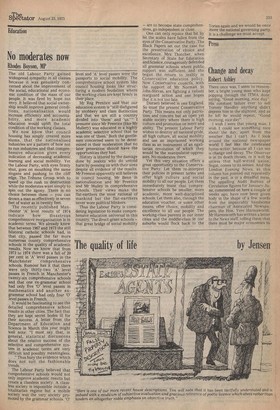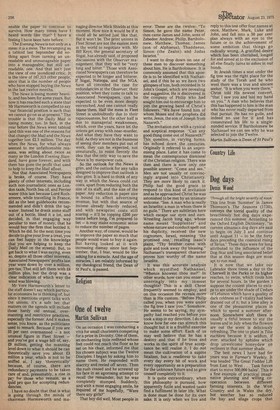Press
Change and decay
Robert Ashley
There once was, I seem to remember, a bright young man who kept popping through the ITMA door, saying, "Good morning, nice day". His constant failure ever to sell Tommy Handley anything 'didn't depress him in the slightest, and as he left he would repeat, "Good morning, nice day".
I wish I were that young. man. I wish I could see something nice about the day, apart from the weather. But 1 can't. As I look around the national newspaper world I feel like the celebrated hymn-writer, because all I can see is change and decay. The Observer is in its death ,throes, or it will be unless that half-witted union, Sogat, comes to its senses. And the London Evening News, as this column has pointed out repeatedly in the past, is in a dreadful mess. The appalling Audit Bureau of Circulation figures for January-June, commented on here a couple of weeks ago, have now been given body in the shape of a few words from the impeccably handsome chairman of Associated Newspapers, the Hon. Vere Harmsworth. Mr Harmsworth has written a letter to the News staff, telling them that there must be major economies to
enable the paper to continue to survive. How many times have heard words like that? I have a feeling I have been here before.
The Evening News is not only in a mess: it is a mess. The revamping as
a tabloid last September did no thing apart from turning an unreadable and unmanageable paper into a manageable, but still un readable, one. And that isn't just the view of one jaundiced critic. It
is the view of 167,313 other people, since that is the number of people who have stopped buying the News in the last twelve months.
The News is losing money heavily, and has been for some years. But
now it has reached such a state that Mr Harmsworth is compelled to say "our financial position is such that we cannot go on as at present." The
trouble is that the Daily Mail is losing money, too. In fact, in the year before the News went tabloid (and this was one of the reasons for that change) the Mail and the News
together lost £2.3 million. The day
when the News, for what always seemed to me unfathomable rea sons, was selling about twice as many as the London Evening Standard, have gone forever, and with them has gone the profit that used to help to keep the Mail afloat.
Not that Associated Newspapers, is broke, of course. They have plenty of other interests, including such non-journalistic ones as Lon don taxis, North Sea oil, and Perrier water (this last because Lord Roth ermere, while travelling in France, did as the best guidebooks recommended and didn't drink the tap water. Instead he drank some stuff out of a bottle, liked it a lot, and decided, in that engaging way
peculiar to men of money, that he
would buy the firm that bottled it. Which he did. So the next time you decide to give your liver a treat, you can feel happy in the knowledge that you are helping to keep the
Daily Mail on the streets). But, to
get back to what I was saying, even so, despite all those other interests, Associated Newspapers' profits last year were down by over a million, pre-tax. That still left them with £8 million plus, but the drop was a clear indication of which way the wind was blowing.
Mr Vere Harmsworth's letter to the staff doesn't say which particu lar economies he is thinking of, but since it mentions urgent talks with the unions, it's a safe bet that matters on the agenda will include those hardy old annual, overmanning and restrictive practices, especially the former. And it makes sense, you know, as the politicians used to remark. Because if you are 35 per cent overmanned — a not unusual figure in Fleet Street — and you've got a wage bill of, say,.
£9 million, getting the manning level down to what it should be can theoretically save you about £3 million a year, which is not to be sniffed at. I say 'theoretically' because, of course, there are redundancy payments to be taken care of and, presumably, a rise in
pa:, for those who remain, as a quid pro quo for accepting redundancies.
I have no doubt that that is what is going through the minds of chairman Harmsworth and ma naging director Mick Shields at this ' moment. How nice it would be if it could all be settled just like that. But it won't be. The print unions in Fleet Street are not the easiest men in the world to negotiate with. Mr Bill Keys, the general secretary of Sogat, has already said, of proposed discussions with the Observer management, that they will be "very long and bitter." Those with Associated Newspapers can therefore be expected to be longer and bitterer. If Sogat, Natsopa, and the NGA, have all conceded the case for redundancies at the Observer, their position, when they come to talk to Associated Newspapers, can be expected to be even more deeply entrenched. And one cannot really blame them. Half the mess in Fleet Street is undoubtedly due to their rapaciousness, but the other half is due to managerial weaknesses, which, over the years, have let the unions get away with near-murder. And what they have they want to hold. As they are not in the business of seeing their members put out of work, they can be expected, not unnaturally, to resist fiercely the idea that the,only way to save the News is by manpower cuts.
So the outlook for the News is grim, and the outlook for any talks designed to improve that outlook is also grim. It is hard to think of any way in which the News could cut costs, apart from reducing both the size of its staff, and the size of the paper. Any reduction in paper size is bound to affect advertising revenue, but with that source of income already heavily reduced, and with newsprint costs still soaring — it'll be topping £200 per tonne before long, I'm prepared to bet — itmay make economic sense to reduce the number of pages.
Another way, of course, would be to improve the paper so much that people would want to buy it again. But having looked at it with increasing dismay since last September, that, I fear, would be like asking for a miracle. And the age of miracles, I am reliably informed by my theological friend, the Dean of St Paul's, is passed.



































 Previous page
Previous page